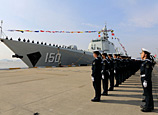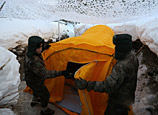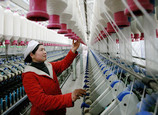
The issue of whether China and Japan will enter into war because of the Diaoyu Islands has been proposed with the recent escalation of the Diaoyu Islands dispute. In China, many netizens and some hawkish people are advocating for the use of force to regain the Diaoyu Islands. In Japan, statements referring to the use of force to protect the islands have also become the trend. Therefore, the conflict between China and Japan is likely to intensify and heighten. In this regard, both Prof. Li Daguang and Prof. Li Xuejun of the National Defense University (NDU) of the Chinese People's Liberation Army (PLA) believe that appropriate preparations for military struggle are needed to curb the occurrence of war.
After taking the office of the prime minister, Shinzo Abe called for tough measures on the territorial dispute with China and planned for an increase of 2% in military spending for the new fiscal year starting from April 1, 2013, which will raise Japan's total military expenditure up to 4.7 trillion yen (US $ 53.4 billion). The increased expenditure will be used to increase the number of ground Self-Defense Force (SDF) personnel, strengthen the navy and the air force, and procure modern military equipment for the armed forces.
In response to this series of measures taken by the Japanese government, it is a must for China to prepare for military struggle. However, preparations for military struggle are not actions of war. It should be implemented appropriately instead of being an overall national strategy.
In view of this, both professors believe that while making necessary preparations for military struggle, China must pay attention to the following three points:
Firstly, China must learn the lesson from the vicious military buildup by the Soviet Union during the arms race in the Cold War. We mustn't exaggerate the severity of foreign threat and react overly, which may potentially deplete the country's limited resources on unlimited combat readiness.
Secondly, China must adhere to the necessary and down-to-earth preparations for military struggle, and shouldn't give up the appropriate and necessary preparations for military struggle because of the excessive worry about being dragged into an arms race.
Lastly, we mustn't blame the necessary and appropriate preparations for military struggle and consider it to be a mistake in strategic policy-making, in retrospect, just because the war doesn't break out. This is a beneficial historical lesson that we've learned in preparation for military struggle.
















 Most feared Spring Festival questions
Most feared Spring Festival questions


![]()
